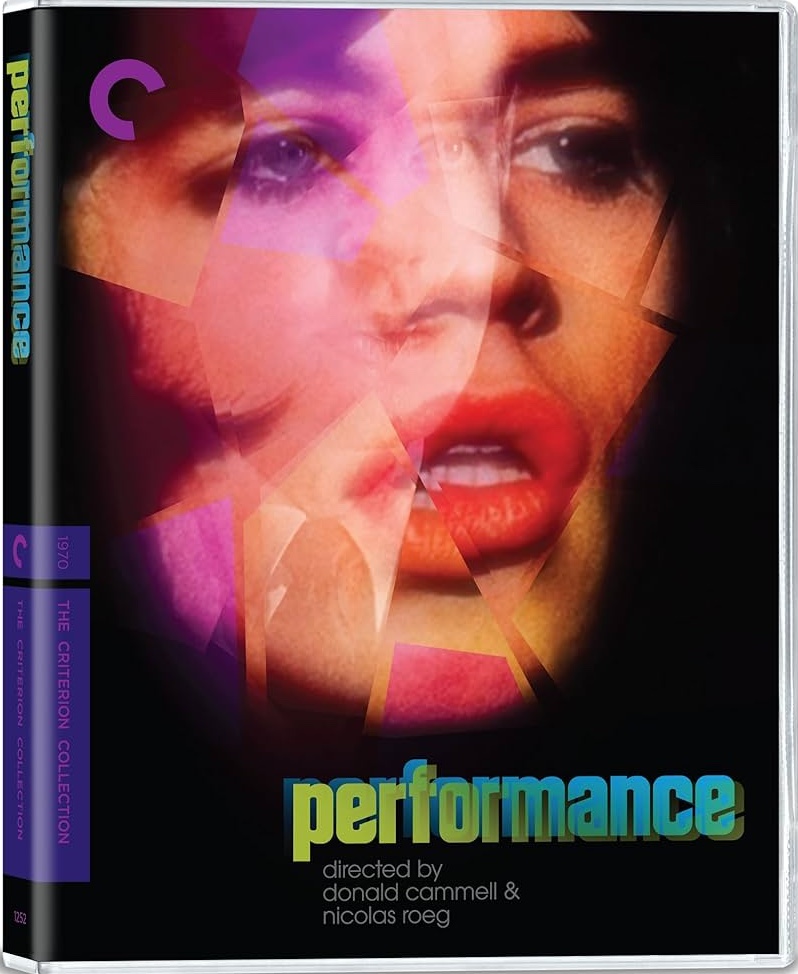Chas (James Fox) is a gangster who pushes his luck too far by executing a rival and earns the ire of his boss Harry Flowers (Johnny Shannon) in a real bad way. Forced to go on the run, he hides out in a Notting Hill basement of a burned out, reclusive rock star named Turner (Mick Jagger) and his swinging consorts. While there, Chas’ and Turner’s identities begin to blur, each becoming a mirror of the other, Chas giving into the more feminine and bohemian and Turner reaching into the well of violence he harbors deep inside. As reality breaks down, will Chas discover who he truly is?
Performance is a very appropriate title for this film. Both leads, Chas and Turner, are putting on performances on the stage of life, hiding a part of who they are in order to fit into the roles society has decided for them. But it is only through a fusing of these seemingly disparate elements can we see them shed their masks. Indeed the whole film itself mirrors this character metamorphosis, a mirror of mirrors. It begins as a relatively conventional crime thriller, gangsters getting revenge within the rigid hierarchal structure of a criminal empire. It’s Chas’ rebellious act that begins to break down the film, immersing the viewer in a hippie decadence from which Chas will not emerge unscathed. When he meets Turner, played very well by first-time actor Mick Jagger, Chas sees everything he isn’t but secretly may want to be. Turner, acting as a kind of metaphysical guru, guides Chas into an awakening but also a reckoning. James Fox in the lead role of Chas approaches the role in a bit of a slippery tone. The gangster Chas is all restrained anger, bottled up waiting to explode. But Fox plays Chas’ slide into the hippie free spirited drug cavalcade as a natural progression. As Chas’ psychological barriers begin to degrade, the film itself begins to break down in terms of conventional structure. It becomes much more experiential. The narrative decays. The editing becomes more frenetic and chaotic. It’s easy to see how co-director Donald Cammell was influenced by Jorge Luis Borges, an author known to have been preoccupied with the liquidity of reality and who frequently wrote abstract and absurdist metafictional stories full of surrealist ideas and mind-bending puzzles. Performance is a puzzle box of a film that begs you to solve its gender-bending and identity-warping maze of confusion but leaving you trapped just as the characters are to their fates.
Performance was previously released by Warner Archive on blu-ray in a decent but somewhat flat transfer sourced from an old master. Criterion has come along and remastered the film from the original 35mm camera negative (as well as an internegative for a few sections), and it looks much better in comparison. The image contains a nicer sense of detail and a more balanced color palette while also looking in general much cleaner and sharper looking. The original mono audio track was also remastered and has a clarity and precision to it that comes through perceptibly. In addition to porting over the previous extras from the Warner Archive blu-ray (which includes the 25-minute documentary Influence and Controversy: Making Performance and the featurette Memo from Turner interviewing Jagger on-set about his character), Criterion has added a few nice, new bonuses. First we have the feature-length documentary Donald Cammell: The Ultimate Performance about the life and work of the troubled co-director/writer of Performance. It’s a very good doc on a person that probably hasn’t received the credit they deserve over the years. It also includes another 30 minutes of outtakes from the Donald Cammell doc. We also get a couple of featurettes on the cockneye dialect used in the film, including a 20-minute one on dialogue coach David Litvinoff. In typical Criterion fashion, we also get a physical booklet with two essays, one about the film from writer/film critic Ryan Gilbey and one on the influences and legacy of Performance by film scholar Peter Wollen, taken from a 1995 issue of Sight & Sound. They are both quite good essays for different reasons. Overall, a very nice, extensive extras package.
Performance is a wholly unique film, a bizarre vision of writer/co-director Donald Cammell and DP/co-director Nicolas Roeg. Together they have crafted a radical treatise on the nature and fluidity of identity and how what’s inside may drive us to be who we truly are. Criterion has also given what is almost certainly the definitive release of this perplexing and mesmerizing film with a significant upgrade in image and several new informative extras.

